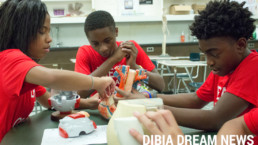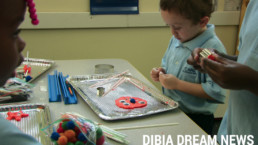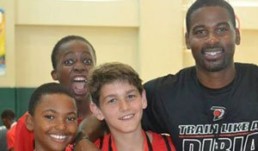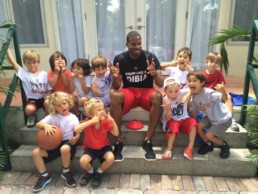Focus on South Florida: Dibia DREAM By Jim Berry
We keep the focus on youth violence and youth safety with an organization that uses sports as an instrument to teach life skills.
The co-founder of “Dibia DREAM” shares his vision and we will meet a 12-year-old who is benefitting from its programs.
Guests:
Brandon A. Okpalobi, Co-Founder, Dibia DREAM
Tyler McCray, Dibia DREAM participant
View Here
Founder, Brandon Okpalobi joins Kelly Blanco to talk about the 'Dibia DREAM Program' and celebrating National Physical Fitness Month.
Brandon Okpalobi joins Kelly Blanco to talk about the 'Dribia Dream Program' and celebrating National Physical Fitness Month
Data News weekly Trailblazer: Helping Make Big Dreams Come True: Brandon Okpalobi by Elise Schenck
Young people today face many obstacles to achieve greatness and reaching their full potential. Oftentimes this is because of a lack of role models. Brandon Okpalobi, a New Orleans native who now calls Miami, Florida home is a shining example of someone that’s spent his life committed to reaching greatness as an individual in addition to being a community servant inspiring and encouraging people across the globe in making their dreams a reality.
Early in Brandon’s life, he was given a recipe for success where his vision could be realized through staying focused and taking a disciplined approach to reach his goals. These seeds were firmly planted in him by his parents and others who helped raise him. Recalling their impact he says, “They say, it takes a village to raise a child, and I am a living testament. My parents, extended family and elders in my community helped me stay on the straight path. I would not be who I am without the unconditional love, support and structure of my parents. My father, Chief Ochendo Chuka Okpalobi, is Nigerian and ruled with an “iron thumb.” and my mother Calla Victoria, a native New Orleanian who was stern, but allowed me to have fun. It is the mix of my parents and community that’s really shaped me into the man I am today.”
He is a graduate of St. Augustine High School, an institution with a rich legacy of turning out young men who become civic, community and business leaders. While a student there Brandon played on the basketball team, he says of his experience as an athlete and the lessons he learned there he has applied to other areas of his life. An example of his fortitude, perseverance, and persistence is after applying to five colleges the University of Miami offered him a partial academic scholarship. Determined to play on the basketball he tried out for the team and received a full scholarship, eventually, becoming the captain of the team in his senior year. Not only did he standout on the court, but also as a student earning a degree in Computer Information Systems.
Brandon Okpalobi’s story exemplifies that with hard work anything is possible. It is the motivation behind his company, DIBIA Athletic Program, that he describes as “Providing elite sports training for athletes to develop fundamental skills through detailed analysis of individual skills, innovative drills and dynamic instruction. Our intense training program is designed for boys and girls, ranging from age 7 to professional athletes. DIBIA trains athletes worldwide and hosts camps/clinics in Miami, New Orleans, LA, Bermuda, Bahamas, Latin America and Nigeria.” Also Mr. Okpalobi has designed a complete line of sports gear which is available on his website dibiaathletic.com.
He speaks passionately about DREAM which is DIBIA’s community outreach initiative. “We bridge their desire for excellence, leadership and sports to educate youth on other essential core value systems. We translate the skills that are required to win in sports into skills that are required to win at life. This allows for the development of a blueprint for success, in language young athletes understand.”
Community Outreach Award presented by the Miami Chamber of Commerce
MIAMI, FL February 18, 2016 -- The Greater Miami Chamber of Commerce announced the winners of the Top Entrepreneurial Awards at The Rusty Pelican in Key Biscayne. The luncheon was emceed by NBC 6 Anchor Jackie Nespral and featured a keynote address by John Kunkel, Founder of 50 Eggs, Inc. The Top Entrepreneurial Awards celebrate South Florida’s entrepreneurial spirit and rich cultural diversity, with finalists representing a variety of industries and showcasing the region’s entrepreneurial business community. Awards were presented in the following categories:
Top Business of the Year -- Large (50+ employees): Since 1979, The Related Group has been one of the defining forces behind South Florida’s evolution. The firm’s developments energize cities; celebrate forward-thinking architecture and urban planning; and create vibrant new ways to live in South Florida’s dynamic neighborhoods.
Top Business of the Year -- Small (49 employees or less): For 35 years Bill Hansen Luxury Catering has catered and produced social and corporate events for hundreds of Fortune 500 firms and thousands of bridal couples, offering a wide variety of unique venues along with innovative catering, event planning, décor and flawless execution.
Executive of the Year: Henry Fleches, CEO of United Data Technologies Inc. (UDT), is a leader in Cloud and Managed Technology solutions. A hands-on CEO, he oversees UDT’s strategy, fiscal performance and corporate culture. Under his leadership, the company grew five times during the recession years and now has 14 locations in eight states. He has helped transform the company, from a value-added reseller to a diversified IT services business assisting companies and government agencies of all sizes.
Corporate Champion for Diversity & Inclusion: Skanska USA is known for building complex construction projects aimed at making communities better. The company has more than 600 employees and 30 active projects in Florida today.
Community Outreach: Dibia Dream fosters life skills development through sports and recreational education for underserved youth. DREAM is DIBIA’s community outreach initiative impacting underserved youth in the community through their Dream Academy (after school programming), Dream Scholars Program (higher education scholarships) and Dream Active Summer Institute.
That’s So South Florida: El Dorado Furniture is the leading home furnishing store in South Florida, offer design expertise in both décor and composition to an ever-expanding global customer base.
South Florida & Beyond: República is a leading, independent, cross-cultural agency that is fearlessly redefining what it is to create relevant, enduring connections between brands and consumers across language and culture – all while nurturing lasting client partnerships and forging an identity of altruism and boundless innovation.
The following finalists were also recognized for their achievements: business categories - Pincho Factory, Inc.; ShadeFLA; Avionica; TekPartners; EcoTech Visions; Ocaquatics Swim School; MasterCard; Sutton Ferneries Inc.; Andes Global Trading; SMX Services & Consulting, Inc.; All Florida Paper, LLC; VITAS Healthcare; individuals categories - Ricardo C. Cury, MD, President and CEO of Radiology Associates of South Florida; and Patricia Bonilla, President/CEO of Lunacon Construction Group.
The 2016 Top Entrepreneurial Awards were made possible by presenting sponsor: Bank of America; gold sponsor: Miami Herald/el Nuevo Herald; silver sponsor: Baptist Health South Florida; bronze sponsors: All Florida Paper LLC; Florida International University; Radiology Associates of South Florida; United Data Technologies; supporting sponsors: Compuquip Technologies/Check Point Software Technologies LTD; Modani Furniture; State Farm Agent Maria Elena Cisneros; WeWork; and video sponsor: Communis Creative.
For more information about the Top Entrepreneurial Awards, contact Elizabeth Galvez at 305-577-5438 or [email protected].
# # #
About Greater Miami Chamber of Commerce
The Greater Miami Chamber of Commerce is the voice of business in South Florida, representing more than 400,000 employees of member companies. It is an association of businesses and professions organized to create progress essential to attaining the social and economic needs of the community. To carry out this mission, the Chamber involves the private sector in community leadership to enhance the economic opportunities and quality of life in the area; while partnering with the community’s economic development and tourism agencies and their initiatives to make our Greater Miami a better place to live, work and play. To learn more, visit www.miamichamber.com.
Taking Hoop Dreams to New Heights: Why One Athlete Took His Skills from the Court to his Company by Summer Suleiman
Brandon Okpalobi was fresh off the court from the University of Miami when he was offered an opportunity for a business development assistantship with the Orange Bowl Committee. The role offered Okpalobi, a computer information system graduate, a jump-start to a promising career in the sports industry. And while he says the experience was valuable, he was eager to pursue more innovative approaches to athletic training. So, he channeled his competitive drive, and went to work.
Okpalobi started DIBIA Athletic Development in 2011, which provides dynamic sports and skills enrichment programs to prepare athletes for life on and off the court (Dibia means “master of knowledge/wisdom” in Igbo, a West African Dialect). Okpalobi has taken the principles he learned growing up in New Orleans as a first generation Nigerian American to all areas of his life.
Okpalobi says his father emphasized the importance of independence, and instilled a sense of confidence in him. His mother, a New Orleans native, taught him killer negotiation tactics, infused with warm southern hospitality that he says has served him well as an entrepreneur.
DIBIA Athletic hosts camps and clinics in Miami, New Orleans, and Bermuda, with plans to launch other international sites. In its first year participating in “Give Miami Day,” DIBIA Dream, the non-profit arm of DIBIA Athletic, raised $20,000 in funding. Their roster is growing. Serving over 200 kids in Miami, DIBIA has plans to add two additional programs and expand to New Orleans in the upcoming school year with the hopes of reaching 500+ kids on a daily basis.
Much like an athlete, Okpalobi says being an entrepreneur means a lot of preparation and hustle. Beyond the radio and magazine interviews, and seemingly glamorous lifestyle, he says every day is game day as an entrepreneur. Okapalobi takes us on the journey to find out what it’s really like taking sweat equity from the court to his company.
Q: When and why did you start DIBIA Athletic & DIBIA Dream?
DIBIA Athletic was developed in 2011. DIBIA was birthed out of the frustration of working for others who lacked vision and the strength to be innovative. I am thankful for every job I had before starting my own business because each one provided me great lessons, taught me management and customer relation skills, and illustrated what it means to be a global company.
DIBIA Dream was developed in 2011. Dream was created because I noticed untended need for life skills instruction in the underserved communities. Every child deserves an equal opportunity to be successful and to be great. Too often and beyond their control, children are victims to low educational standards, lack of exposure and are being taught by teachers who are not vested in their development.
Q: Can you tell me about your lowest, darkest point as an entrepreneur? A moment when you thought, what am I doing or why am I doing this?
DIBIA Dream was definitely fast-tracked. We moved quickly from the idea phase to implementation phase without adequate funding. This took a toll in the formative stages, which took away energy from our mission.
We had an idea, and it started with kids on Saturdays, and from there I said we’re not really changing anything, we’re only seeing kids once a month, so I said let’s do it daily, and that changed things. We talked to some early sponsors and we were going through negotiations, and certain things didn’t go through, but we were already in the process, so it took a lot of DIBIA Athletic stepping up to the plate. We had some key sponsors who, for whatever reason, chose to give less or didn’t support at the level we expected, and we had to move forward.
There were questions we had to answer like how are we going to pay staff? How are we going to buy supplies? How are we going to take off on this program? The main thing was that we didn’t want to disappoint the kids and not fulfill the promise we made. That was a huge stress to figure out how to make it happen. At that time, we were five or six months fresh as a non-profit, so it’s harder to get larger corporations to sponsor you when you’re new. Those were some pretty dark months.
Q: How did you get through that moment?
Because DIBIA Athletic was profitable, we were able to shift some things around and pull resources for DIBIA Dream. And at that point, we were gaining momentum, so that helped us reach out to more sponsors and do more fundraising.
Q: What is your biggest struggle as an entrepreneur?
Right now it’s about making my vision a reality. At the end of the day, my struggle is that I have all of these ideas in my head, but how do I make them come to life? They require manpower, business structure, resources, and funding. We need other big players to buy in and commit so we can execute the vision.
It’s easy to have that great idea, and buy that $7.99 domain on GoDaddy, but the execution and implementation that comes after that is the real struggle.
Q: In your experience, what would you consider a failure you’ve had as an entrepreneur?
We had our guest NBA athlete cancel on us days before our Bermuda Camp in 2012. He was called by the NBA, and had to take on that responsibility. I had a feeling that week that something was not going to work out. I got to Bermuda on Friday, the camp was on Monday, and Saturday he told us he wasn’t going to be able to make it. We were scrambling calling every agent, contact, and friend in the field.
And on Saturday, we said, we have to figure out how to make this the best camp possible. We gave out the more gear, we had more food, and we did everything possible to make up for it. We thought how do we make it up to the kids?
We told the kids, we just found out about this on Saturday, and if you want a refund, we will honor it. And out of 60+ kids, only one person wanted a partial refund. And that was amazing. And that was our first year and our second camp. It taught us to endure and be prepared for anything.
That moment really changed our future operational procedures. For that particular camp, my staff and I brainstormed, pooled resources, and came up with a solution that would make the best of a bad situation. With teamwork, determination and a positive outlook, the camp was a success. Actually, it has been one of our best camps to date.
Q: Why do you keep pushing forward even after failures?
Failures give you the most important lessons; we must have them to become our better selves. The standards for my company and myself are extremely high, so a failure will never set us back. It will set us up to do better the next time.
I have a passion, and a purpose and I won’t allow one bad experience to rain on my parade. I am from New Orleans – I have to reference Mardi Gras at least once!
Q: What motivates you to wake up each morning and do the work you do?
I am an athlete and I am extremely competitive, so I want to make sure that DIBIA Athletic is the best training company on the planet. With DIBIA Dream, my goal is to make sure every underserved youth has the chance to be great, dream big, and has equitable access to all opportunities.
What you see daily is that minority and underserved youth are not afforded opportunities that other kids are. If you read the statistics that are out there today, they’re unbelievable. 35% of African-American youth graduate from high school. I just met with one of my friends who works in child services here in Miami, and there were two kids there. One was standing in front of the judge, he must have been in the third grade. There was another kid that was so tiny, he wasn’t even up to my knee in height, and he was a defendant. What could he have possibly done, I thought?
After seeing that a month ago, it was a moment for me. This is why I’m doing this. These kids don’t have a chance because no one says to them you’re special or you’re a great kid. These kids go back to neighborhoods where anything negative you can imagine is out there. They need to see something different. And if you can impact them in their younger ages, then you have a chance.
“These are kids. They could be the next leaders or the next murderers. How are we going to change that? That is the push, to go into these communities and help change that.”
Q: What do you think is the biggest misconception about being an entrepreneur?
“The glamorous side of being an entrepreneur can be very deceiving. People only see the flexibility of your work hours, the awards, events, and other accolades. What they do not see are the sleepless nights, lost relationships, the struggle to prove that your business is credible, and most of all, the stress.”
Some people tell me that they want to be me when they grow up. They probably would not want to be me on my worst day. Being an entrepreneur takes hard work, dedication, tough skin, desire, persistence, and an unwavering belief in yourself. I have pulled countless all-nighters to make sure events were pulled together, an idea was vetted, or website content was perfect.
Most people think entrepreneurs wake up at 11am and relax in their home office and that money just comes in. I serve as the owner and employee for every position for both DIBIA Athletic and DIBIA Dream. As entrepreneurs, we do all of the jobs for a company until we are able to (hopefully) bring in other staff to help with those functions.
Q: What’s the biggest challenge you face in the work you do with DIBIA?
With DIBIA Athletic, it’s managing expansion and bringing new ideas into fruition. People ask me daily about expanding our reach to other cities, countries and locations. While expansion is the goal, we want to make sure that each time someone attends our events or works with us, that they are provided with the best experience possible. New ideas for DIBIA Athletic come to me daily. But it’s about figuring out which ones will continue to separate us from the pack, shine a positive light on the work we are currently doing, and help athletes achieve success on and off the field.
With DIBIA Dream, we would love to help every child, but sometimes the task seems daunting. Expansion and funding to other sites for our Dream Academy are our biggest challenges. In the non-profit sector, funding is vital. We work daily to highlight all of our successes and to consistently research interested donors to make sure partnerships are mutually beneficial.
Q: What do you enjoy the most about being an entrepreneur?
“The NBA has a saying, “I Love This Game!” That’s my approach. For any professional sports game, there are hours of preparation, practice, and training. They practice the game plays to ensure that they are prepared for the game. I apply the same process to entrepreneurship. You have to practice your passion and put in the work to reap the reward. I have always been competitive and that is why I love being an entrepreneur. I control my destiny!”
Q: What real advice would you give to someone who is thinking about starting their own company? No fluff. Real advice. Perhaps it is something you wish someone had told you before you started DIBIA?
First, I would encourage them to keep their job while perfecting their entrepreneurial craft and save up 2-3 years’ worth of operating expenses.
Don’t settle for “No.” When you hear no, that just means this person, company, or sponsor is not the right partner for you. That should lead you to knock on another door, write another proposal, submit another grant, or select another venue that is better for you.
Friend or Foe? You have to know when to separate yourself from negative people. As an entrepreneur, you will not have time to deal with negativity. You need people around you who are genuinely happy for your successes. Note from The Distillery: Know how to differentiate between negativity and constructive criticism.
Be investment ready. You have to market yourself, so be ready for potential investments, sponsorships, and partnerships. This is extremely important because people want to be associated with success, but have your internal operations in order first.
All Eyes on You. Remember that you are being watched by all sorts of people. You represent your brand, so you have to be on your best behavior and be mindful of your actions. When playing college basketball, I learned that there is always a microphone listening (watch what you say), someone watching (watch your actions), and there is always a camera filming (be on your best behavior in public and private settings).
Q: Any other thoughts or insights you would like to share with our readers on the real experience of being an entrepreneur?
Never ever quit. Dream big. Train like a DIBIA!
SOURCE



